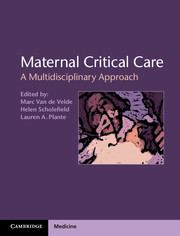Book contents
- Maternal Critical Care
- Maternal Critical Care
- Copyright page
- Dedication
- Contents
- Contributors
- Preface
- Section 1 General non-medical considerations
- Chapter 1 The scope for maternal critical care: epidemiology
- Chapter 2 Service organization: hospital and departmental
- Chapter 3 Competency and personnel
- Chapter 4 Planning for elective and emergency problems
- Chapter 5 Midwifery and nursing issues in the intensive care setting
- Chapter 6 Decisions related to the beginning and end of life
- Chapter 7 Support of the family and staff
- Chapter 8 Recovery from intensive care and the next pregnancy
- Chapter 9 Maternal critical care in the developing world
- Section 2 General medical considerations
- Section 3 Special critical care tools and techniques
- Section 4 The pregnant patient with coexisting disease
- Section 5 Serious problems related to pregnancy
- Index
Chapter 9 - Maternal critical care in the developing world
from Section 1 - General non-medical considerations
Published online by Cambridge University Press: 05 July 2013
- Maternal Critical Care
- Maternal Critical Care
- Copyright page
- Dedication
- Contents
- Contributors
- Preface
- Section 1 General non-medical considerations
- Chapter 1 The scope for maternal critical care: epidemiology
- Chapter 2 Service organization: hospital and departmental
- Chapter 3 Competency and personnel
- Chapter 4 Planning for elective and emergency problems
- Chapter 5 Midwifery and nursing issues in the intensive care setting
- Chapter 6 Decisions related to the beginning and end of life
- Chapter 7 Support of the family and staff
- Chapter 8 Recovery from intensive care and the next pregnancy
- Chapter 9 Maternal critical care in the developing world
- Section 2 General medical considerations
- Section 3 Special critical care tools and techniques
- Section 4 The pregnant patient with coexisting disease
- Section 5 Serious problems related to pregnancy
- Index
Summary
- Type
- Chapter
- Information
- Maternal Critical CareA Multidisciplinary Approach, pp. 88 - 106Publisher: Cambridge University PressPrint publication year: 2013

